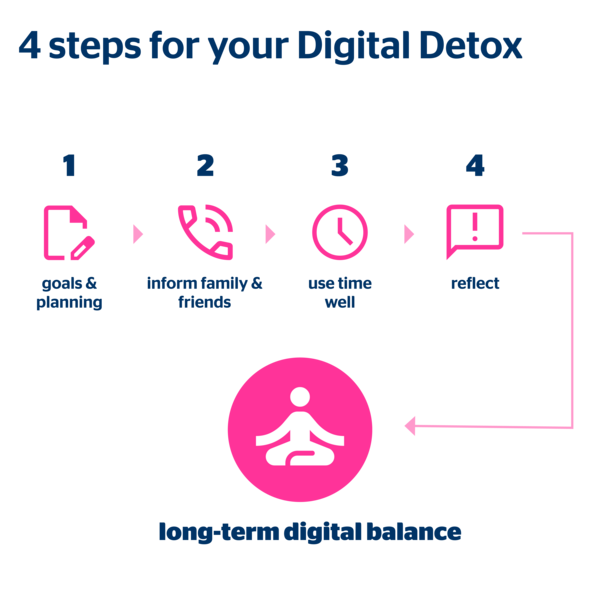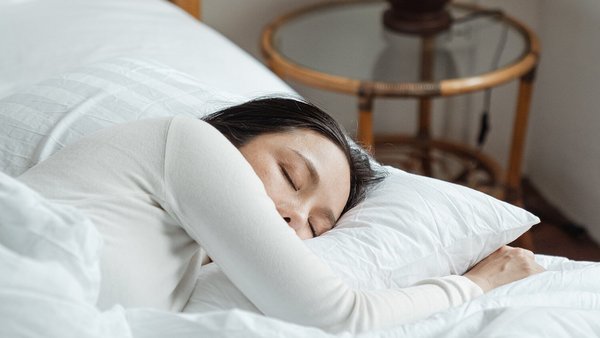Digital detox – the best tips for a digital time-out
|

reading time: ca. 7 minutes
- The so-called ‘digital detox’ refers to media-free periods in which you deliberately avoid the internet, social media, and other digital technologies. This improves both mental and physical well-being.
- To make your digital detox a success, you should prepare your offline days well. Inform your friends and find useful alternatives for your newly gained free time. Plus, be sure to reflect afterwards and establish long-term changes that permanently reduce your digital stress.
- A few tips will make it easier to create a healthy digital balance in everyday life. These include, for example, regular smartphone-free breaks, switching off push notifications, and socialising with like-minded people.
- Certain apps can help you to raise your awareness of your own screen time.
We wake up with our smartphones in the morning and fall asleep in front of our laptops at night: It is normal now for modern technologies to accompany us throughout the day. However, the "always-on" mentality causes stress, poor concentration, and sleep issues. That's why it makes sense to consciously take a digital break from time to time and avoid mobile phones, tablets, and other devices for a while.
Digital technologies are part of our everyday lives. They simplify a lot of things, both professionally and in our private lives. The problem is: In our modern and digital world, usage quickly gets out of hand. On average, we look at our mobile phones more than 200 times a day. Being constantly exposed to smartphones, laptops, and television is not healthy for us and our bodies in the long term.
If the brain is constantly distracted by media stimuli, it can no longer process new information and form neuronal connections. We need these, for example, when we are learning something new. In addition, our brain doesn't get enough breaks and regeneration – and this leads to constant stress and overstimulation.
Digital detox is a conscious decision to do without electronic media for a while. The newly gained time can be used for many other valuable things. If you aim to live a healthier life in the long term, you don't return to your old behaviour, but develop better media habits in everyday life. The key: finding your digital balance!
But is such a detox even worth it? Researchers say yes. Neck pain, increased strain on the eyes, reduced attention span, stress, and depression – all those are symptoms of excessive technology consumption.
Our sleeping habits are affected, too. Blue light from screens prevents the body from forming melatonin, the so-called sleep hormone. If you always have the internet at your fingertips, your problem-solving skills might also suffer. Why try to figure something out if you can just google it?
5 good reasons for a digital detox
- You can concentrate more easily, are less distracted, and more productive.
- You improve your physical and mental health.
- You have less stress and find it easier to relax.
- You sleep better and feel more recovered.
- You have more time for other things you enjoy.
- Tiredness
- Concentration difficulties
- Sleep issues
- Increased stress levels
- Headaches, eye and neck pain
- Lower productivity
- Neglect of social relationships, exercise, and hobbies

How to make your digital detox a success
To make your screen break a success, you should be well prepared.
Afterwards, establish good habits for the future to lead a healthier life in the long term.
- Step 1: Set clear goals and plan properly.
- Step 2: Inform your family and friends.
- Step 3: Use free time well and find alternatives.
- Step 4: Reflect and plan long-term habits.

Step 1: Set clear goals and plan properly
Think about why you want to carry out a digital detox beforehand. What positive changes do you wish for? How will it change and improve your everyday life? Everything is easier when you have clear goals in mind.
To plan properly, you should also ask yourself the following questions:
- How long should the break last?
- Can I do without all media, or do I need exceptions, for example for professional reasons?
- How will I keep in touch with others?
- Can I continue with my job during this time?
- How do I use the time I have gained?
- How do I prevent a relapse?
Step 2: Inform your family and friends
It is important to inform others around you in advance. This will let your friends and family know that you won't be answering messages or calls for a while.
You also need to prepare your work accordingly. Depending on your job, it may be possible to carry out other (analogue) tasks during the digital break. If this is not an option, you should take a few days off. Or limit yourself to the weekends. Even short periods of time can have a significant impact.
Set up out-of-office notifications, a note in your status, or a message on your voicemail. This reminds your contacts that you can only be reached offline.
Step 3: Use free time well and find alternatives
Here we go: the digital break begins!
Switch off all devices and put them out of reach to avoid temptation.
You'll be surprised how much more time you suddenly have at your disposal.
Use the new free time for activities you enjoy, for example:

- Going for a walk
- Physical exercise
- Self-care, relaxation exercises, or wellness
- Meeting friends
- Getting creative
- Making music
- Reading
- Playing board games
- Cooking
Instead of a smartphone, you wake up to an analogue alarm clock; instead of search engines and Google Maps, you use books and city maps.
How does this slow down your everyday life? Perhaps you keep one or two analogue alternatives for the long term instead of always picking up your smartphone straight away?
Step 4: Reflect and plan long-term habits
At the end, you should reflect on your detox. Answer the following questions for yourself:
- What worked well, and what didn't?
- What have I learnt for the future?
- What positive changes have I noticed?
- In which fields or situations did I particularly miss digital devices?
- The other way round: In which fields or situations did I manage perfectly well without them?
- What new habits would I like to adopt in the long term?
A digital time-out is good, but a healthy approach to digital media in the long term is even better.

What does a detox look like in practice? Our colleague Nathalie from our Product Management department tried it out for herself.
However, she limited herself to Instagram: “I realised that I spend a lot of time on Instagram and consume plenty of content that isn't actually interesting or useful at all. A friend and I then made a bet: Who can go six weeks without Instagram?”
To avoid a relapse, Nathalie deactivated her profile and deleted the app. “The first day was difficult and the social pressure from others was high,” she reveals. “After a few days, that eased considerably. I started trying out recipes, bought two recipe books, and cooked fresh meals instead of spending hours looking at useless reels.”
The result: Nathalie not only won the bet – she didn't reactivate her profile even after the six weeks. “I don't feel the need to use Instagram again for now. I don't miss it and I can use the time for more meaningful things.”
Nathalie's most important tips from her detox experience are simple: make the barrier as big as possible (for example by deleting the app), find an alternative activity or outlet, and create an incentive – in her case, a joint challenge with a friend.
Digital detox is trending
Society is becoming increasingly aware of the benefits of a digital time-out. More and more people are planning to reduce their screen time or go on a digital detox.
If a few hours without smartphone are not enough for you, you might like the holiday trend from the US: So-called detox holidays combine internet withdrawal with wellness. The program features massages, facial masks, yoga, and meditation. The rule is: “No smartphones allowed!”
But even over here, offline holidays are becoming more and more popular and are now offered in a wide variety of destinations, from Wi-Fi-free forest huts, remote mountain villages, and old monasteries to total radio silence in jungle or desert camps. In some resorts, there is even no electricity at all. You really can't get more digital detox than that!



